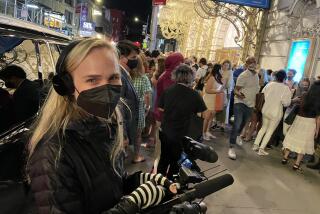No-longer-little orphaned Annies
- Share via
The very words “child star” seem to betoken tragedy: In the story as we often heard it told, early success presages later sorrow. There are the usual tales of drugs and crime and teenage marriages, of parental neglect or parasitic control, but there is also the simple American tragedy of Not Being Famous Anymore.
“Life After Tomorrow,” a film by Julie Stevens and Gil Cates Jr. premiering Sunday night on Showtime, takes a look at this phenomenon as embodied in the moppet musical “Annie.” Like a lot of documentaries in a day when technology has put the means to make a movie into the hands of anyone with the itch, it is being touted as a “personal journey,” Stevens having played an “orphan” both on Broadway and on tour and not having booked a job quite as good since.
If you know nothing about “Annie” itself before watching “Life After Tomorrow,” you will not know much more afterward, besides that there are orphans in it, and a dog, and a bald man in a suit, that you’re never fully dressed without a smile and that tomorrow is only a day away. You’ll learn nothing about the comic strip it was based on, or much about the context in which the show was made, other than that the country was in a sorry state -- the musical was written during the Nixon administration, though it didn’t hit Broadway until Jimmy Carter was president -- and its creators thought of their work as a “song of spirit and of hope.”
“Annie” fever struck America. We meet here a man who must certainly qualify as No. 1 Fan -- and who feels it necessary to explain that he is neither gay nor a pedophile. It was simpler for little girls, of course, for whom the musical provided much the same sort of fantasy focus as Disney princesses do now, with the advantage that one could actually join the show and not even have to grow up first to do it. After the first cast, to judge by the women interviewed here -- some 40 out of the 150 who passed through the show in its five-year initial run and first four national touring companies -- every kid who tried out for “Annie” was already obsessed with it.
The film takes a roughly chronological ride through the life of the show, and the lives of the children who played in it (getting cast, instant fame, eye-opening life on Broadway and/or the road, crazy stage mothers and jealous costars, often negative though sometimes positive effect on family, end of the job and the rest of your life). The reminiscences naturally tend to the more sensational, since these make the better stories -- though they are only moderately sensational, to be sure.
It was a dream that not only couldn’t last, but couldn’t last long. Biology saw to that. Stage manager Peter Lawrence recalls, “We had a kind of a rule on the show that once the stagehands started to get interested in the orphans, it was time for them to move on to another job.” (He means it was time for the girls to move on, I think, though that rule might usefully have been applied to the stagehands.)
It’s a strange thing to peak at 12, but life goes on, and these are women with histories now: Andrea McArdle, the original Annie, is 43; Stevens is 36. Some turned into swans, some ducks, some are happy, others less so. Some have remained in show business, for better or worse; some have had other kinds of success, even if just the success of not needing show-business success -- of getting along without the love of strangers. Among those appearing here, the best known are Sarah Jessica Parker, who was Broadway Annie No. 3; MSNBC anchor Dara Brown; soap opera star Martha Byrne; Danielle Brisebois, who was on “Archie Bunker’s Place”; and Allison Smith, a regular on “Kate and Allie” and a semi-regular on “The West Wing.”
*
‘Life After Tomorrow’
Where: Showtime
When: 8 p.m. Sunday
More to Read
The biggest entertainment stories
Get our big stories about Hollywood, film, television, music, arts, culture and more right in your inbox as soon as they publish.
You may occasionally receive promotional content from the Los Angeles Times.










